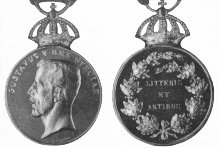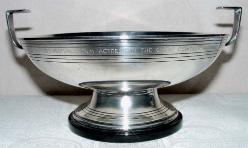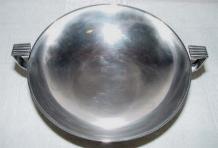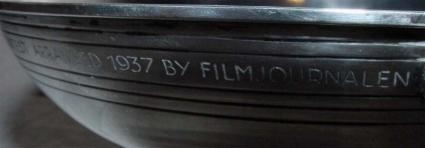Garbo's Awards - Part I
– By Wes Connors – |
|
| Film Daily “Ten Bests”
In 1922, Film Daily began their “Ten Bests”:
Film Daily: 1927 Ten Best (#10) - MGM - Flesh and the Devil
Film Daily: 1930 Ten Best (#5) - MGM - Anna Christie
Film Daily: 1932 Best (#1) - MGM - Grand Hotel
Film Daily: 1935 Ten Best (#10) - MGM - Anna Karenina
Film Daily: 1940 Ten Best (#3) - MGM - Ninotchka
|
| |
| The New York Times “Ten Bests”
The New York Times began their annual “Ten Best” awards in 1924. I believe (not sure) I read somewhere their 1923 list was discovered, and I have it, then; however, I didn't look for it because I don't expect it included any Garbo films:
The New York Times: 1930 Ten Best (#10) - MGM - Anna Christie
The New York Times: 1932 Ten Best (#4) - MGM - Grand Hotel
The New York Times: 1935 Ten Best Female Performances (#1) - Greta Garbo - Anna Karenina
The New York Times: 1937 Ten Best (#9) - MGM - Camille
The New York Times: 1939 Ten Best (#9) - MGM - Ninotchka
– I was surprised no Garbo films were included during the 1920s, but their lists are full of excellent films. I did look at the original NYT articles and discovered an additional “Ten Best” performances listed for actors and actresses of 1935 – with Garbo listed first among the actresses.
|
| |
| 1936 - Litteris et artibus
Swedish Medal for Arts and Science

On December 30, 1936, Greta received word that she had been awarded the blue ribbon of Litteris et artibus, Sweden's highest acknowledgment of the arts.
Unable to attend an official presentation and obviously overwhelmed by the very idea, she wired her appreciation to Sweden's ambassador to the United States, Wolmar Bostrom.
“Thank you for your telegram. May I ask the ambassador to pass on my mots profound gratitude to his majesty the king.”
Garbo was the first motion picture actress to be so honored and s he had been mentioned for this award as early as 1934.
|
| |
The National Board of Review

The National Board of Review began their Awards in 1930. Most years, but not all, had films listed alphabetically. “Best Acting” awards were started in 1937:
National Board of Review: 1930 Ten Best - MGM - Romance
National Board of Review: 1932 Ten Best - MGM - As You Desire Me
National Board of Review: 1935 Ten Best - MGM - Anna Karenina
National Board of Review: 1937 Ten Best (#4) - MGM - Camille
National Board of Review: 1937 Best Acting - Charles Boyer - Conquest
National Board of Review: 1937 Best Acting - Greta Garbo - Camille
National Board of Review: 1937 Best Acting - Maria Ouspenskaya - Conquest
National Board of Review: 1939 Ten Best (#4) - MGM - Ninotchka
National Board of Review: 1939 Best Acting - Greta Garbo - Ninotchka
National Board of Review: 1941 Best Acting - Greta Garbo - Two-Faced Woman
– The Board's “Best Acting” awards varied from around 5-20 performances. All were considered “winners”, though they sometimes exceeded all the Academy Award nominations. Lead and supporting performances were considered equally. The appearance of Romance over Anna Christie surprised me in the 1930 list. I consider Romance the inferior film, but I guess it looked better, back then. Even more interesting is the citation of Garbo's acting in Two-Faced Woman.
Note that the awards were announced on 20 December 1941; so, the National Board is evaluating the uncensored Two-Faced Woman, NOT the one we have today (which I consider a badly edited, but well acted, film). The Board began “Best Actor” awards in 1945.
|
| |
| 1937 - Filmjournalen Cup
Garbo got this ward for "The Most Prominent Film actress"
 


|
| |
| The UK Picturegoer
The UK Picturegoer did Photoplay one better, and awarded “Best Actor” Gold Medals. I don't have a complete list of these, but I have an important “win” for Garbo.
In 1932, Garbo won the first “Gold Medal” I could find, but I assumed this was a “favorite” or “box office” award, which I don't include. Here is an incomplete Picturegoer list:
Picturegoer: 1934 Best Actress - Greta Garbo - Queen Christina
Picturegoer: 1937 Best Actor - Charles Boyer - Marie Walewska (Conquest)

Picturegoer's 1934 Best Actress Award
– The British Academy didn't begin awarding until 1947.
|
| |
| Venice Film Festival
Of the important Film Festivals, only Venice handed out awards during Garbo's tenure in films. The first Venice Festival was held in 1932:
Venice Film Festival: 1934 Foreign Film (Nom.) - Rouben Mamoulian - Queen Christina
Venice Film Festival: 1935 Best Foreign Film - Clarence Brown - Anna Karenina
– The Cannes Festival began awards in 1946, and the Berlin Festival started in 1951. The Festivals didn't really consider films “Nominated”; rather, films were screened as “in competition”.
|
| |
The New York Film Critics

One of the most respected awards filmmakers could receive was given by The New York Film Critics. I believe Bette Davis once stated this was considered a more desirable “win” than an Oscar, during the ‘30s. These started in 1935:
New York Film Critics: 1935 Best Actress - Greta Garbo - Anna Karenina
New York Film Critics: 1937 Best Actress - Greta Garbo - Camille
New York Film Critics: 1939 Actress #2 (Nom.) - Greta Garbo - Ninotchka
New York Film Critics: 1941 Actress #3 (Nom.) - Greta Garbo - Two-Faced Woman
– Another appearance by the infamous Two-Faced Woman. Both the National Board of Review and The New York Film Critics Circle considered Garbo's performance as one of the best of the year! Like the Board, the Circle was evaluating the uncensored film.
The 1941 Awards, and voting ballots/standings were announced 31 December 1941; so, once again, this would have to be the uncensored Two-Faced Woman.
|
| |
Daily Variety's “Oscar Poll”
Daily Variety had an “Oscar Poll”, but I don't believe it was held during Garbo's career. This 1950 poll is widely reported:
Daily Variety: (1950 poll of 200 filmmakers) Best Actress of the Half Century (Silent) - Greta Garbo
Daily Variety: (1950 poll of 200 filmmakers) Best Actress of the Half Century (Overall) - Greta Garbo
– Charlie Chaplin was the corresponding actor winner. I believe this, and the honorary Oscar, show Garbo's reputation continuing into the 1950s, and beyond. Maybe risking a reputation like this helped her avoid all those “comebacks”?
|
| |
| The Rosettes
Rosette (Filmgoer‘s Companion, L. Halliwell): Lifetime - Greta Garbo - 1933 Peak - Queen Christina
Rosette (Filmgoer‘s Companion, L.Halliwell): Lifetime - Melvyn Douglas - 1939 Peak - Ninotchka
– I'm not sure how/when the Rosettes were first awarded. There are several books, and several editions. I don't recall seeing the Rosette Awarded in the first edition (1965); I just looked at it very quickly, in a library, though.
|
| |
| The New York Festival
The New York Festival screened the following films, which was considered, in itself, an honor:
New York Film Festival: 1966 Screened - Clarence Brown - A Woman of Affairs
New York Film Festival: 1977 Screened - Monta Bell - The Torrent
|
| |
Canadian Centennial Commission
Canadian Centennial Commission: (1967 critics poll) All-Time Best Comedy (#18) - Ninotchka (Lubitsch, 1939)
Top Fifty (1967 The Great Films, Bosley Crowther): 1923 - The Story of Gösta Berling
Top Fifty (1967 The Great Films, Bosley Crowther): 1936 - Camille
Top Fifty (1967 The Great Films, Bosley Crowther): 1939 - Ninotchka
Top Fifty (1970 50 Classic Motion Pictures, David Zinman): 1932 - Grand Hotel
Top Fifty (1970 50 Classic Motion Pictures, David Zinman): 1939 - Ninotchka
|
| |
| |
|
Introduction Garbo's Awards - Part II
|
 |
| |
Garbo's Oscar |
 |
| |
Walk of Fame |
 |